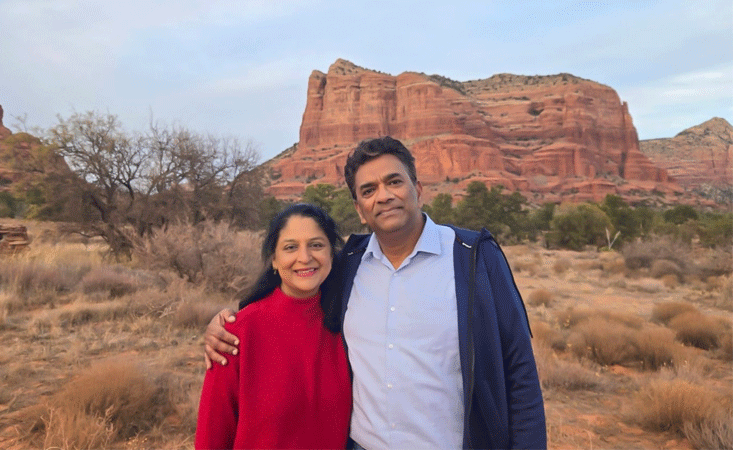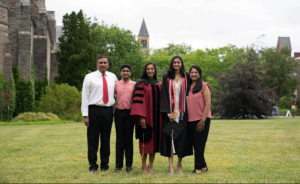
Pancreatic cancer survivor Pranathi Perati and her husband
Pranathi Perati almost cancelled the endoscopy appointment she had scheduled. Antacids seemed to be helping the abdominal discomfort she had been experiencing, but at the urging of her husband, she followed through with the procedure.
Although the doctor found nothing abnormal, there was something pressing on her stomach that made it difficult to maneuver the scope. This finding led to a follow-up CT scan and an endoscopic ultrasound – and a stage IIB pancreatic cancer diagnosis.
Looking back, she’s grateful that the cancer was caught early.
“A few weeks or months would have made a difference between a stage IIB and a stage IV diagnosis, as this cancer progresses very quickly,” she said. “If I had not followed through with the endoscopy that July morning, I may not have been so lucky.”
That was July 2016. Pranathi and her husband had three children – ages 19, 17 and 8. Shocked and overwhelmed, the family rallied behind Pranathi and poured their energy into figuring out the best path forward.
Pranathi had the Whipple procedure a day after her 24th wedding anniversary. This was followed by six months of chemotherapy and several follow-up surgeries. Then, in 2020, the disease recurred in Pranathi’s lungs. She had two more surgeries, along with more rounds of chemotherapy and radiation therapy.
Throughout her treatment journey, clinical trials have been key. She enrolled in one in 2021 that combined immunotherapy with chemotherapy and another she’s enrolled in now targets the specific mutation driving her cancer.
For Pranathi, she’s grateful for the access to new treatment options that clinical trials provide and the opportunity to help advance research.
“Clinical trials are a unique opportunity for cancer survivors to be part of cutting-edge research,” she said. “Survivors help themselves by trying out new therapies with possibly fewer side effects than standard-of-care therapies and pave the path by participating in scientific research, allowing new therapies to be available for future cancer patients.”
Biomarker Testing Leads to Clinical Trial
One critical first step Pranathi took to unlock the full potential of clinical trials: Tumor biomarker testing. She learned important information about her tumor’s biology and was able to use that information to inform decisions.
The clinical trial she’s currently enrolled in is testing a treatment that targets the mutation driving her cancer. Participants are united not by the type of cancer they have – it’s open to patients with pancreas, colorectal and non-small cell lung cancer – but by having specific mutations within the RAS family of genes. More than 90% of people with pancreatic cancer have some type of RAS mutation, so this area is of particular interest to pancreatic cancer researchers. This early-stage trial tests the safety and dosage of the experimental therapy.
She relied on PanCAN Patient Services to help her and her family navigate the many decisions to be made throughout her treatment journey. Her Case Manager helped to find cancer centers, specialists, clinical trials and more.
“Patient Services did an extensive search of clinical trials that were available to me, following up with me a couple of weeks later to ensure I had no questions,” she said. “The support I received made me feel hopeful and heard in a time when I felt most vulnerable.”
Another important way that PanCAN helped – and something Pranathi encourages other patients and families to pursue: A second opinion.
“Don’t hesitate to reach out to multiple institutions for opinions,” she said. “In my experience, I have been very transparent with all my care providers about seeking multiple opinions before making the best next care decision for myself, and my care providers have respected me for this transparency.”
She also asks every patient diagnosed with pancreatic cancer to consider genetic testing so that family members can understand as much as possible about any inherited risk.
“Genetic testing was important to me as my blood relatives were able to learn more about their risk of developing cancer down the road,” she said. “We now know that my cancer did not come from a hereditary mutation.”
The Path Forward
Now, as Pranathi looks back at the last eight years and the path forward, she feels hopeful. Her children are now adults and her cancer diagnosis has impacted them in profound ways. Her oldest child – inspired in part by Pranathi’s surgeon – now practices medicine.
“Currently, Dr. Perati is a general surgery resident and aspires to be a surgical oncologist and surgeon-scientist,” Pranathi said. “I am her ‘why’ for this decision.”
Her middle child saw in her mother’s experience the importance of sharing every patient’s unique story, prompting her to seek out those whose voices aren’t always heard.
“In college, she volunteered with underserved communities which fueled her desire to advocate for patients who had been overlooked by the healthcare system,” Pranathi said. “She realized that humanistic medicine – listening to patients’ stories and seeing them as a whole person – is just as important as novel research.”
Now as a medical student she is pursuing immunotherapy, surgical oncology and palliative surgery research with a goal to improve outcomes and quality of life of cancer patients, especially those who belong to underserved populations.
The Perati’s youngest child, currently a senior in high school, hopes to pursue a degree in biology in college. Inspired by his mom’s journey, he has already done several independent research projects using AI models for cancer diagnosis and early detection of metastasis.
Through it all, her family has been the anchor, including her husband, who she calls “my biggest cheerleader and strongest advocate.” Together, they’re advocating for Pranathi and for all people with pancreatic cancer through participating in PanCAN PurpleStride and raising awareness. They want everyone to have the gift of time.
“We have had the privilege of enjoying many family milestones together: high school graduations, college graduations, white coat ceremonies, medical school graduations, and family vacations,” she said. “It is the anticipation of future milestones together that gives me the will to keep pushing.”
Any treatments, including clinical trials, mentioned in this story may not be appropriate or available for all patients. Doctors take many things into account when prescribing treatments including the stage and type of cancer and the overall health of the patient. Contact PanCAN Patient Services for personalized treatment options.
















